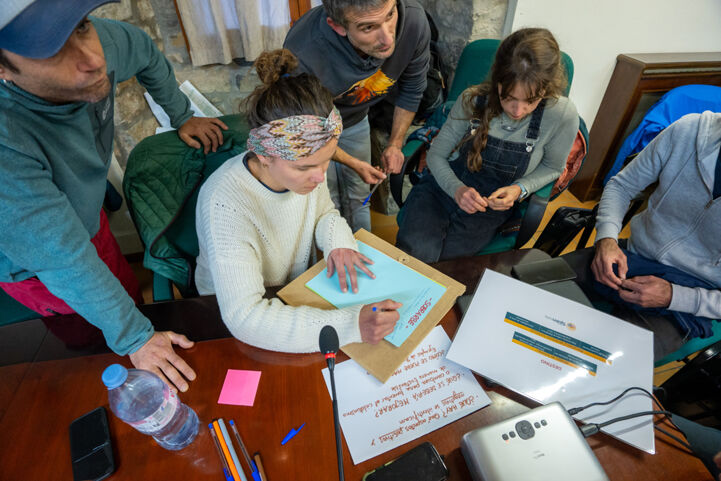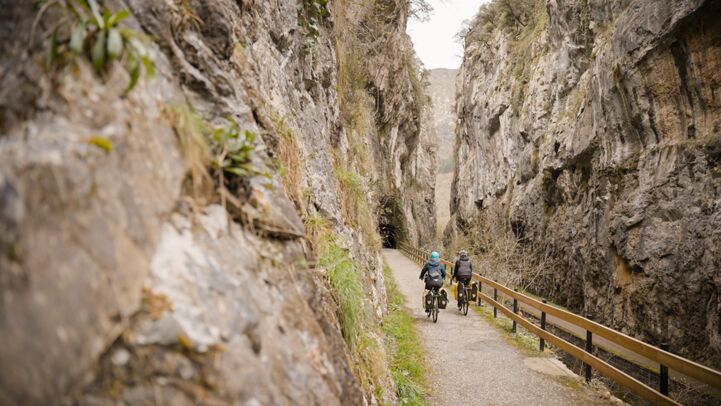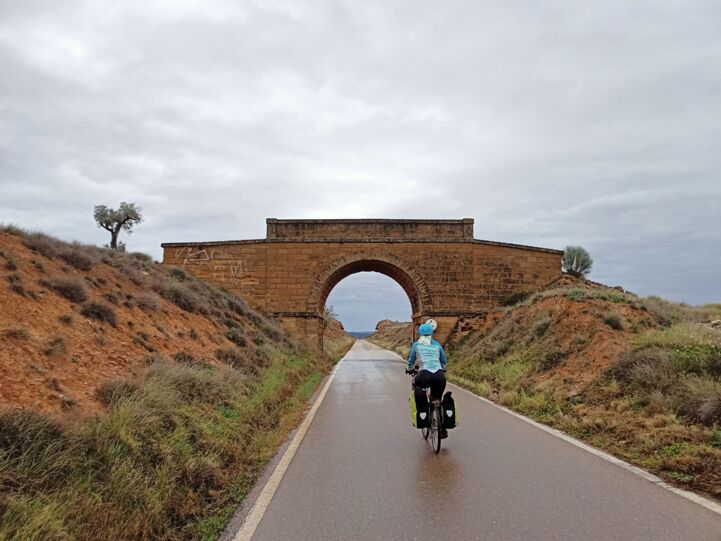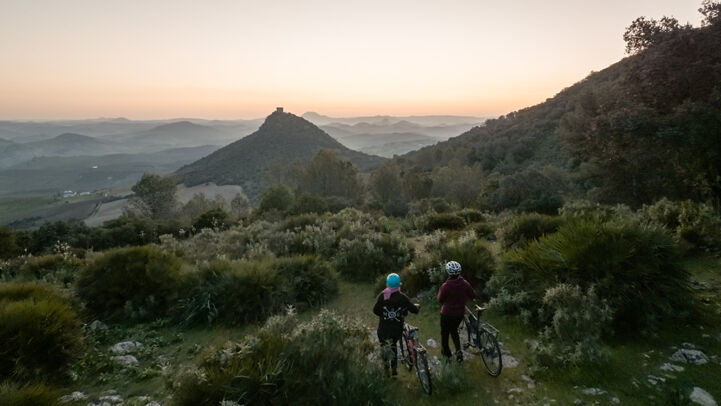Pedal Spain: growing Spain into a cycling tourism destination
ECF: What is Pedal Spain?
Belén Calahorro Lizondo (BCL): Pedal Spain is a 15-month project that aims to influence the Spanish cycling tourism experience. It takes advantage of a sector with great potential, tackling unbalanced tourism and seasonality. It lasts until 30 September 2025 and has a budget of 881,000€, supported by the Ministry of Industry and Tourism and the Spanish Government through the EU Next Generation Funds.
The project is based on three pillars. The first one is creating a story about cycling tourism in Spain. We want to build a universal experience, inclusive of all cyclists, types of bicycles, destinations and origins, both national and international. The second pillar is governance: the project involves all the driving agents, administrations and civil society associations, including ConBici, as well as companies – this is the great strength of this project. Pedal Spain’s third pillar is to centralise the information in one place, through a marketplace and a website. It will promote all products and destinations of cycling tourism in Spain at once.
The project involves 12 partners and is led by ConBici, the leading organisation in promoting cycling as a mode of transport, with extensive experience working with public and private entities and acting as Spanish National EuroVelo Coordination Centre. The other 11 partners are 10 companies and one NGO: Rutas Pangea, Biela y Tierra, Ciclería, BikeFriendly, Hualapai Travel, EntreTierras, Turybike, Multiaventura Buendía, S-Cape Travel, Mediterranean Biketours and the Centro Cicloturista Subbética.

ECF: How is cycling tourism in Spain developing?
BCL: Cycling tourism is one of the most promising sectors in our country. It offers effective solutions to challenges associated with unbalanced tourism and seasonality. As a sustainable and environmentally friendly activity, it is not only a growing global trend but also a significant economic driver. Every year, thousands of visitors of all ages and backgrounds choose our destinations for cycling. With its favourable climate and diverse geography, Spain is uniquely positioned to become a leading destination, following the successful examples of countries like France and Germany. The country can count on well-established products such as EuroVelo routes, the Camino de Santiago, and the Vías Verdes.
Pedal Spain was created against this backdrop: its main objective is to position Spain as a world-class cycling tourism destination, while bringing together key stakeholders in the sector. The initiative aims to establish the National Coordination Centre for Cycling Tourism in Spain, fostering collaboration and driving the growth of this promising industry.
ECF: What activities are being carried out as part of Pedal Spain?
BCL: We are working on several key actions by the end of the project:
- Cycling Tourism Coordination Centre (CCCE): A central hub designed as a collaborative network of stakeholders to oversee and coordinate project activities. It will serve as a long-term meeting point for professionals in the sector, with the goal of sustaining and strengthening Spain as a leading cycling tourism destination.
- Documentation and Storytelling of Cycling Tourism in Spain: The project will collect and document diverse experiences related to cycling tourism across the country, forming a compelling narrative to support its promotion, communication, and marketing. This story will be developed through more than 20 regional workshops and interviews with key stakeholders.
- Development of a Digital Platform: Creation of a dedicated website and online marketplace to connect cycling tourists with specialised services, tailored routes, and relevant local offers.
- Social Media Promotion: Implementation of a strategic communication campaign to raise Spain’s profile as a premier cycling tourism destination and engage the global cycling community.
- Guided Cycle Tours: Pilot programs featuring guided tours that showcase the natural and cultural heritage of several Spanish regions, offering tourists an immersive and authentic experience.
- Professional Workshops: A series of eight professional workshops led by partner organisations to provide training, share best practices, and strengthen skills within the cycling tourism sector.
- Cycle Tourism Fair – Feria del Cicloturismo: A flagship event to be held in Zaragoza from 12 to 14 September 2025. The fair will showcase the project’s progress and results while fostering networking and collaboration opportunities across the industry, as well as promoting cycling in Spain to end users.

ECF: What does the project want to achieve on the long run?
BCL: Pedal Spain aims to establish a Cycling Tourism Coordination Centre (CCCE), which will be the reference entity for the development and promotion of cycling tourism in Spain, continuing the work beyond the end of the project.
Its objectives are to promote cycling tourism in Spain, support cooperation and coordination between all partners involved (public, private, and civil society), and encourage economic development and competitiveness. It will do so while keeping dialogue and communication with the users.

For now, 177 organisations joined the CCCE, including national institutions such as Renfe, regional administrations such as Murcia or Girona, municipalities, actors of the cycling tourism economy and associations. More organisations are invited to join, from civil society and NGOs, to administrations at all levels (national, regional, provincial) and private companies (travel agencies, repair shops, accommodations, etc). Expression of interest should be shared by signing the Manifesto and sending it back to [email protected].
The CCCE will benefit its members by providing networking opportunities with other stakeholders, visibility for its members' projects and initiatives, and access to information and resources. It is an opportunity to increase the impact of its members’ activities. CCCE members will also get advantages in promotion of products, routes or destinations and services, which will be highlighted in the marketplace and on the website.
We are still defining how the CCCE will operate, but the current work on the national governance of cycling tourism is a significant step forward.
ECF: How is Pedal Spain connected to EuroVelo in Spain?
BCL: EuroVelo has been used as a best practice and case study for Pedal Spain. ConBici's experience as the National EuroVelo Coordination Centre for Spain has inspired the concept of a Cycling Tourism Coordination Centre (CCCE), for example. EuroVelo is also a reference for infrastructure and cycle route quality standards and for the promotion of cycling tourism offers. Pedal Spain is closely connected to the work done on EuroVelo in Spain.
ECF: Have you used European good practices when establishing Pedal Spain and its action plan?
BCL: Absolutely – the initial phase of the project focused on studying best practices. As mentioned, we drew from the EuroVelo experience, while analysing governance models in other countries to help shape the CCCE. We also looked at examples such as Fiets en Wandelbeurs, the role of private companies, infrastructure development, and the creation of dedicated websites like France Vélo Tourisme, among others.
ECF: What have you learned from leading Pedal Spain so far?
BCL: ConBici has gained lots of experience from leading Pedal Spain – personally, I am especially inspired by getting to know the people and organisations who are passionate about promoting cycling tourism all across our country. It’s clear that Spain has enormous potential as a cycling destination, and the cycling community is more than ready to help make it a reality.
ECF: In conclusion, how will cycling tourism in Spain look like in five or ten years?
BCL: In five to ten years, I envision Spain as a leading international destination for cycling tourism – recognised not only for its diverse landscapes and climate, but also for the quality and sustainability of the cycling experience it offers. I see a well-connected national network that brings together key public and private stakeholders through a Cycling Tourism Coordination Centre, working collaboratively to implement a shared strategy.
Cycling tourism will help reduce seasonal tourism pressures, encourage year-round travel, and promote balanced development across all regions. Most importantly, it will offer meaningful experiences for all types of cyclists, making Spain a benchmark for inclusive, accessible, and enjoyable cycling tourism.

Interview by Agathe Daudibon